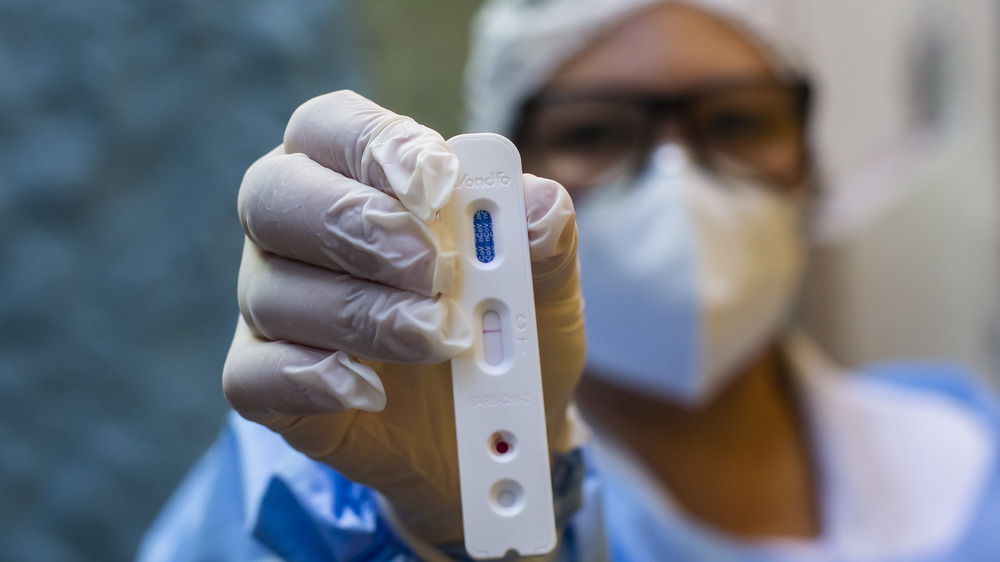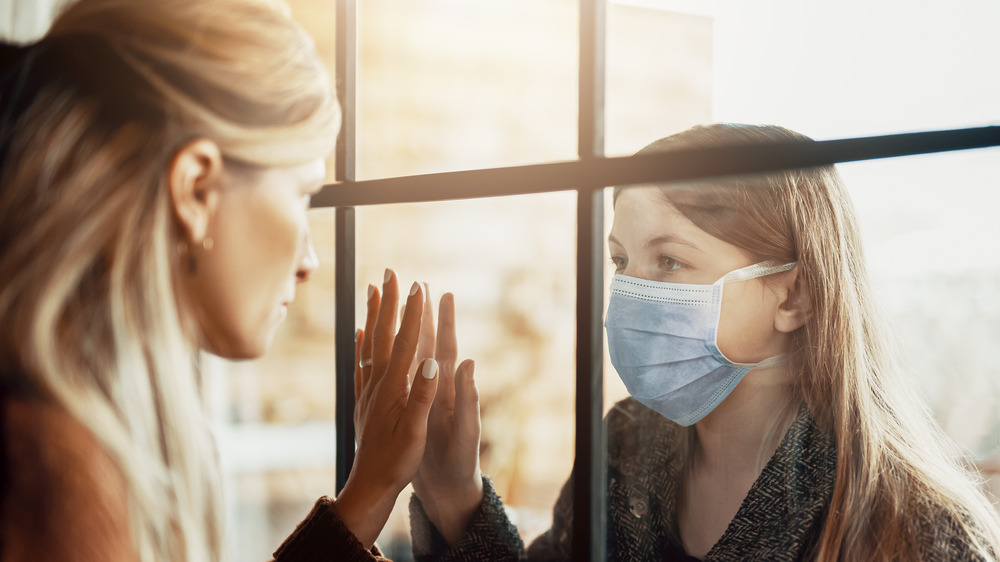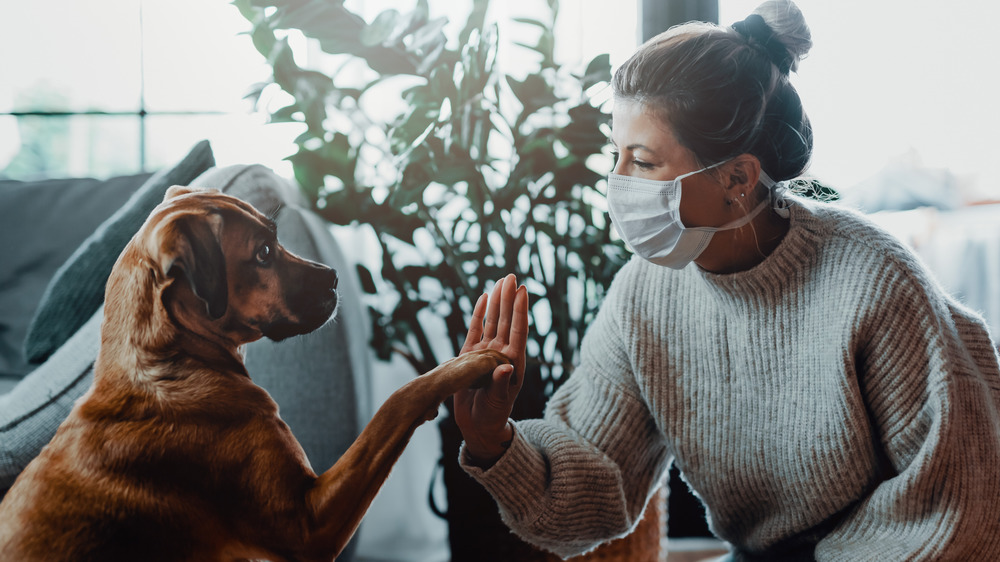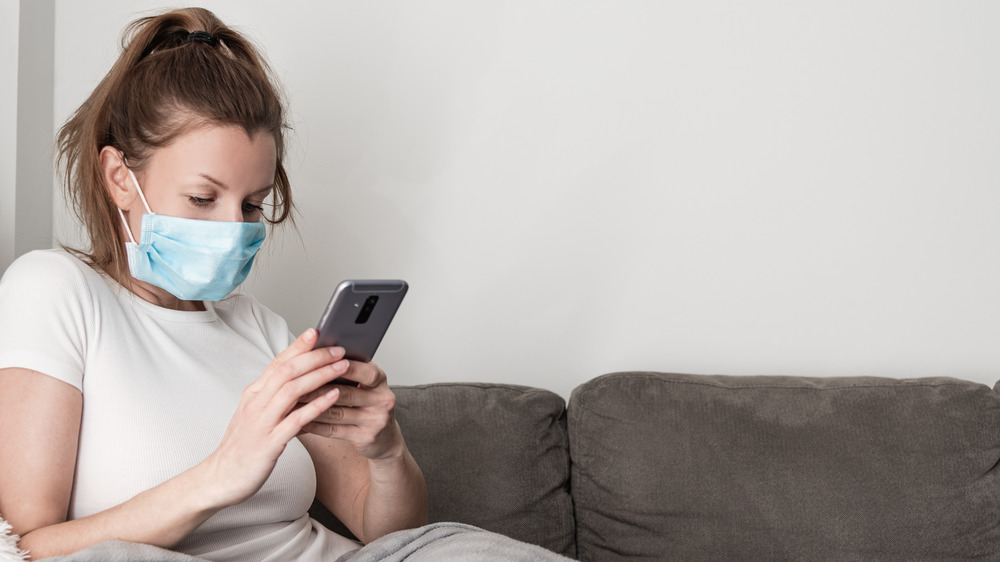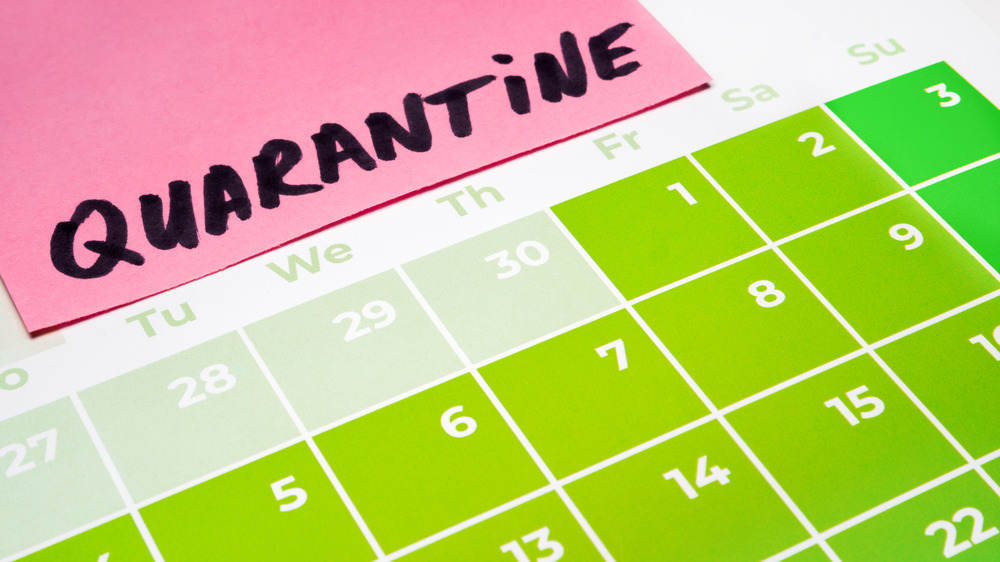The First Thing You Should Do If You Test Positive For COVID-19
We may receive a commission on purchases made from links.
The COVID-19 pandemic has become a part of our reality for the past nine months, and at times many, of us almost feel complacent about it. It's easy to fall into the trap of thinking if we haven't been infected yet, we're probably home free. As ever-rising infection rates indicate, this couldn't be farther from the truth. If you've already been infected, you may (or may not) be immune for a certain period of time, but if you've yet to come down with the virus, you're in just as much danger now as you were this spring. More, actually, since eight months ago, many of us were self-quarantining, and once quarantine restrictions eased up, it was summertime so we could socially distance outdoors. In the wintertime, however, people not living in tropical climates tend to hang out inside, not to mention the holiday season brings larger gatherings and greater potential for virus spreading
If you haven't gotten that nose swab yet, it's probably time to swing by your nearest testing center. Chances are, your test will come back negative and all will be well. But what if this doesn't happen? What if your test comes back positive, what do you do? The first thing you should do, according to Dr. Jennifer Haythe, Associate Professor of Medicine at Columbia University Irving Medical Center, is to stay calm and not panic. As she tells us, "The majority of people with COVID-19 will have mild to moderate symptoms and be just fine."
Make sure those around you remain uninfected
If you are sharing your household with other people, they will obviously need to be tested, too, as soon as possible. If your fellow household members, be they family members or roommates, remain uninfected, you'll need to keep as far away from them as you can (not easy in a studio apartment, true). Haythe says you should stay quarantined in a separate bedroom, should your living space afford such a thing, and have your meals left outside the door. What's more, she cautions, "family members should wear an N95 mask, goggles, and gloves if they need to interact with you."
You should obviously avoid preparing food for anyone besides yourself, of course, and Haythe also warns that you should make sure to close the toilet lid before flushing if you're sharing a bathroom. The reason for this precaution, she tells us, is "there is evidence that coronavirus can be found in stool," and yes, micro-particles of that substance do disperse in the air whenever you flush with the lid still up so you might want to adopt this habit anyway whether or not you're COVID positive.
Stay safe even if you're on your own
If you live on your own, there won't be nearly as much danger of you infecting other people, although Haythe notes, "Positive patients who live alone should quarantine in their house and arrange for food and deliveries to be dropped off outside." No-contact delivery, after all, is for the protection of the delivery person as well as the customer. She also says you'll need to "contact your health care provider and friends and family to make sure someone can check on you by phone or video every day."
Another thing you can do is to use a home pulse oximeter, should you happen to have one on hand, to check your oxygen saturation level every morning and evening. If you don't already own a pulse oximeter but this sounds like something you want to have, you can purchase one from Amazon for under $17. According to Haythe, oxygen saturation levels of 97 percent or higher are normal. If your levels drop below this, however, the Minnesota Department of Health says that low oxygen levels may be an early warning sign that you're in need of medical help. While the pulse oximeter can obviously be used by people who live with others, when you are on your own, sometimes you need the extra reassurance that being able to perform such health checks may afford.
Inform those you've come into contact with
It's the ethical thing to do to let your contacts know you've tested positive, at least if you've been in fairly close proximity to any of them over the past 2 weeks (the CDC currently states that the incubation period for the virus may be as long as 14 days, although the median time of infection is 4 to 5 days from exposure).
What if this is just too embarrassing, though? Or what if there's an overwhelmingly large number of people who could have breathed in your germs, since you maybe flew on a plane or attended some kind of super spreader event? No matter what the reason may be that you're not able to disclose your diagnosis to those whom you may have infected, Haythe offers a possible solution to the problem. She informs us, "You can give contact names to the Department of Health who will perform contact tracing and inform those individuals that a person they came into contact with has tested positive for COVID-19."
Wait out the quarantine
Haythe advises, "In most instances, it is safe to come out of quarantine 10 days after testing positive if you have no symptoms." Should you continue to be symptomatic, however, she warns, "You should not leave quarantine and should contact your doctor."
Even if the 10 days aren't up, you should still see your doctor or even visit the emergency room if your symptoms worsen. Haythe says that in addition to dropping oxygen levels, other causes for concern include feeling short of breath or having chest pain. You should also take note if you have a feeling that "something just doesn't seem right." Whatever you do, don't try to tough it out. COVID-19 isn't a cold, a flu, or any other illness you may have been able to power through in the past. You're not only endangering yourself, but potentially countless numbers of other people, if you fail to take this illness seriously.

